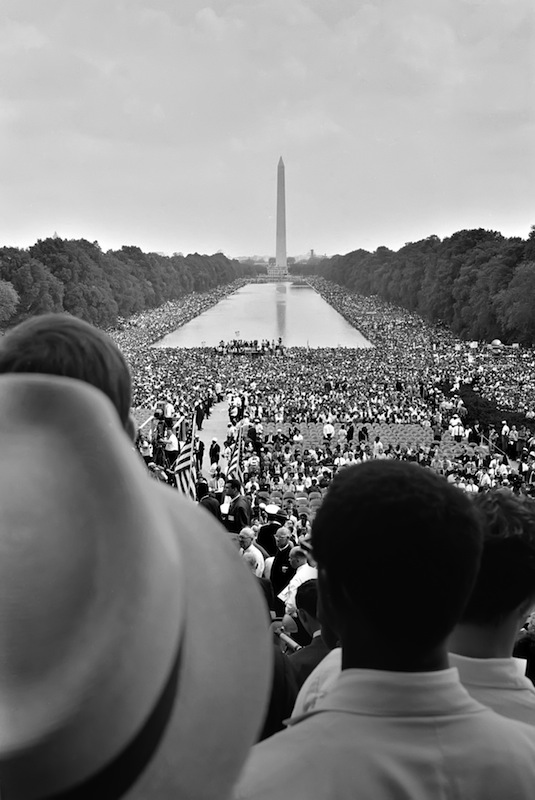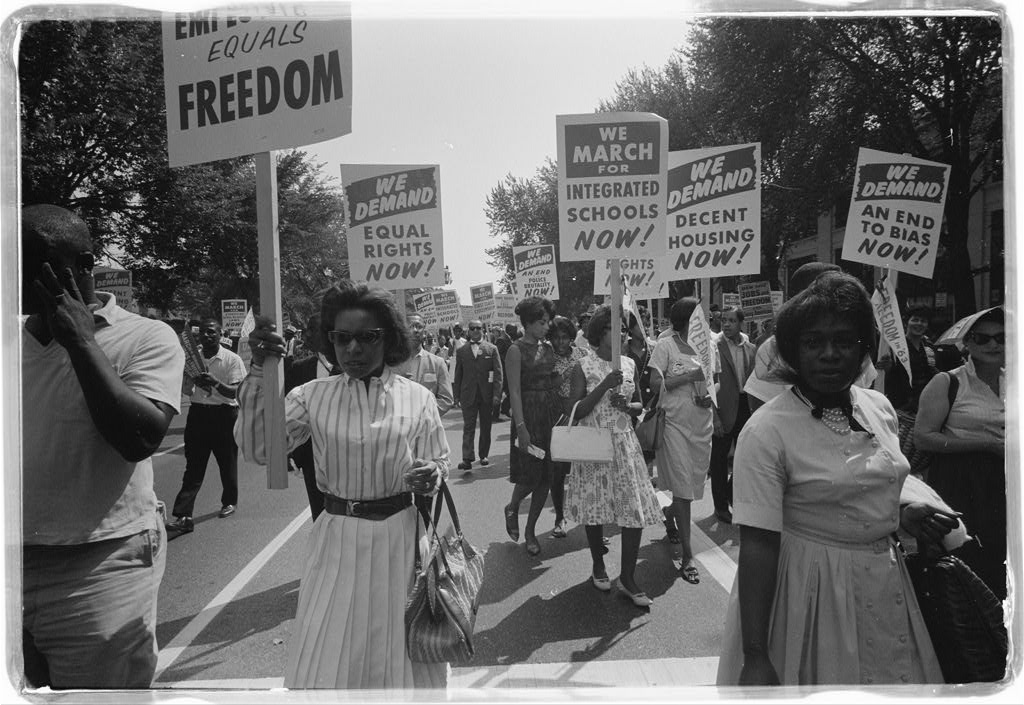A Dream Deferred: America's Changing View of Civil Rights

Fifty years ago, on Aug. 28, 1963, Martin Luther King, Jr. stood in front of more than 250,000 protesters in Washington, D.C., and called for the end of racial discrimination in the United States in his iconic "I Have a Dream" speech. The political rally, which became known as the March on Washington, and King's speech became cornerstones of the American civil rights movement.
But the day after people celebrated the 50th anniversary of the March on Washington and the legacy of the civil rights movement, many minority groups, including African-Americans, are still fighting for equality, sociologists say.
"Many black people, and other people of color, are experiencing the kinds of racial inequalities that were very much present during the days of the civil rights movement," said Aldon Morris, a professor of sociology at Northwestern University in Evanston, Ill., and co-author of "Oppositional Consciousness: The Subjective Roots of Social Protest" (University of Chicago Press, 2001).
While the civil rights movement propelled racial inequality into the national spotlight, and helped usher in landmark anti-discrimination legislation, such as the 1964 Civil Rights Act and the 1965 Voting Rights Act, the idea that Americans live in a post-racial society is a myth, Morris told LiveScience. [10 Historically Significant Political Protests]
"I think many people wish to believe that the civil rights movement largely accomplished its goals, and that the racial nightmare is over and the dream has been achieved," Morris said. "Yes, there has been considerable change since the heyday of the civil rights movement, but the huge problem emerges when we look at the difference between what people say or believe and what they do."

Fifty years later
The March on Washington was officially known as the March on Washington for Jobs and Freedoms, and hundreds of thousands of marchers flooded the nation's capital to demonstrate in support of civic and economic rights for African-Americans. Yet decades later, African-American communities are still struggling with issues such as unemployment, education and home ownership, said John Skrentny, professor of sociology and director of the Center for Comparative Immigration Studies at the University of California, San Diego.
Sign up for the Live Science daily newsletter now
Get the world’s most fascinating discoveries delivered straight to your inbox.
"There has certainly been enormous amounts of progress, but African-Americans, by a lot of indicators, are still as bad off as they were 50 years ago," Skrentny told LiveScience. "Their unemployment rate is twice as high, their incarceration rates are very high, and measures of African-American wealth are quite low."
This is partly because in the decades since the March on Washington, the civil rights story has receded in the public eye, and the government's focus has shifted elsewhere, he said.
"Other political issues have risen to prominence, and I think a big part of the story is that the Republican Party does not make a play for African-American votes, whereas with other groups — and I'm thinking specifically of Latinos and gays and lesbians — the Republican Party is in the game for those votes. Not to the extent of the Democrats, but in their postmortem of the 2012 election, it was something that was talked about explicitly," Skrentny said.
This shift has thrust other issues, such as immigration reform and same-sex marriage legislation, to the forefront. And while these issues also deserve time and attention, political leaders should understand the work that catapulted inequality into the political sphere during the civil rights movement is not yet complete, Skrentny added. [10 Milestones in Gay Rights History]
"It's really difficult to identify a single policy designed to advance the interests of African-Americans in the last 20 years," he said.
From the foreground to the background
The political change largely began in the 1980s and 1990s, with the rise of the New Democrats, an ideologically centrist arm of the Democratic Party that gained prominence following the 1988 presidential election won by George H.W. Bush. Some members of the New Democrats felt that their party had aligned themselves too closely to African-American interests, and they tried to distance themselves from advancing policies directly targeted at African-American communities, Skrentny said.
For instance, during the 1992 presidential campaign, then Governor Bill Clinton publicly criticized rapper and activist Sister Souljah (her real name is Lisa Williamson) for racially charged remarks about violence in that year's Los Angeles riots. The episode became known as the "Sister Souljah moment," and was widely seen as a strategic move to court centrist voters by demonstrating that Clinton was not bound by African-American interest groups, who were perceived to be closely associated with the Democratic Party.
Even Barack Obama, the first African-American president of the United States, may feel even more hesitant than previous Democratic presidents to throw weight behind overtly African-American issues, for fear that his detractors might accuse him of favoring one community over others, Skrentny said.
"Political leaders discovered that if you try to do too much for African-Americans, working-class whites will say: Why are you helping these people? We have problems, too," Skrentny said. "When it comes to big political issues, white voters who are economically insecure — and that's not to say they're racist, just economically insecure — typically react in a negative way." [Understanding the 10 Most Destructive Human Behaviors]
For things to change, Morris says people need to actively study how various forms of inequality are manifested in society. "Only when people allow themselves to be exposed to the truth about the nature of inequality in any society will they be able to engage in meaningful action to bring about change," Morris said.
One thing the government can do is conduct detailed audits of companies to assess and manage the level of discrimination during their hiring process, Skrentny said.
"We need reliable, nonpartisan measures of how much discrimination is out there, and these types of audits are good ways to take the temperature of discrimination," he said.
A more extensive initiative to address inequality could be to study unemployment based on the geographical distribution of different communities, Skrentny said. For instance, the government tends to use low tax rates to lure companies into more rural or suburban areas of the country. But African-Americans, in particular, tend to live in urban neighborhoods, and may be limited in their abilities to commute to jobs in other, more distant localities.
"We have to limit different geographic localities from competing with one another, because that isolates certain workers," Skrentny said.
Fighting for rights
While anti-discrimination policies such as affirmative action have helped, more sweeping changes throughout society are needed, Morris and Skrentny said. Affirmative action aims to prevent the exclusion of individuals based on race, color, religion, sex or national origin in areas of employment, education and business.
"We spend a lot of time debating affirmative action, but fixing employment problems and incarceration problems is very difficult," Skrentny said. "It's easier to just make the numbers right in colleges, but it still doesn't get at the heart of the problem."
And while the legacy of the March on Washington should be celebrated, Americans should understand that many communities are still struggling for deep-seated change, Morris said.
"To claim that we are now in a post-racial society — to claim that skin color and so forth no longer matters, is to really engage in a myth that is soothing, but at the same time, does not address reality," he said.
Follow Denise Chow on Twitter @denisechow. Follow LiveScience @livescience, Facebook & Google+. Original article on LiveScience.

Denise Chow was the assistant managing editor at Live Science before moving to NBC News as a science reporter, where she focuses on general science and climate change. Before joining the Live Science team in 2013, she spent two years as a staff writer for Space.com, writing about rocket launches and covering NASA's final three space shuttle missions. A Canadian transplant, Denise has a bachelor's degree from the University of Toronto, and a master's degree in journalism from New York University.









